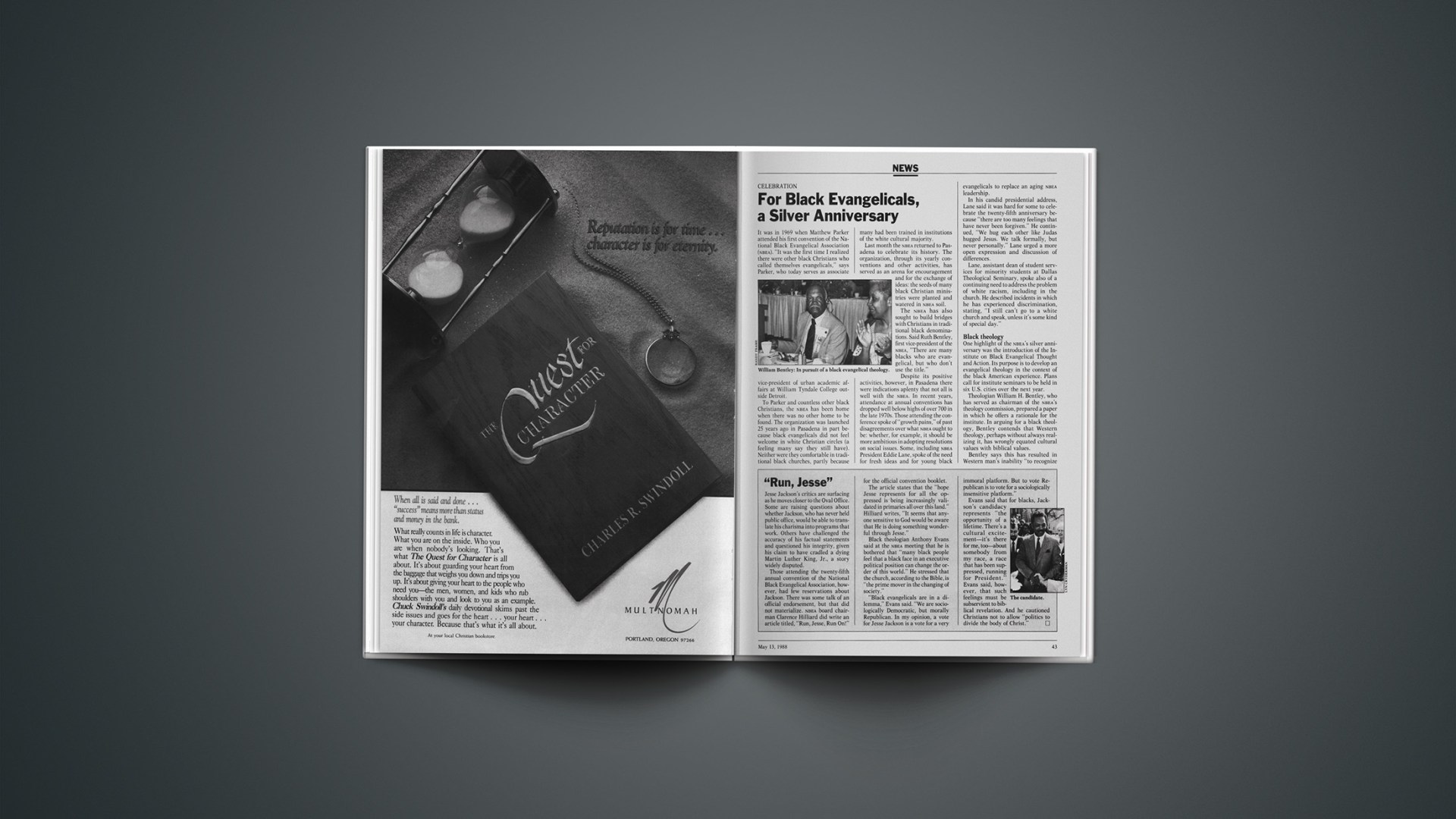CELEBRATION
It was in 1969 when Matthew Parker attended his first convention of the National Black Evangelical Association (NBEA). “It was the first time I realized there were other black Christians who called themselves evangelicals,” says Parker, who today serves as associate vice-president of urban academic affairs at William Tyndale College outside Detroit.
To Parker and countless other black Christians, the NBEA has been home when there was no other home to be found. The organization was launched 25 years ago in Pasadena in part because black evangelicals did not feel welcome in white Christian circles (a feeling many say they still have). Neither were they comfortable in traditional black churches, partly because many had been trained in institutions of the white cultural majority.
Last month the NBEA returned to Pasadena to celebrate its history. The organization, through its yearly conventions and other activities, has served as an arena for encouragement and for the exchange of ideas: the seeds of many black Christian ministries were planted and watered in NBEA soil.
The NBEA has also sought to build bridges with Christians in traditional black denominations. Said Ruth Bentley, first vice-president of the NBEA, “There are many blacks who are evangelical, but who don’t use the title.”
“Run, Jesse”
Jesse Jackson’s critics are surfacing as he moves closer to the Oval Office. Some are raising questions about whether Jackson, who has never held public office, would be able to translate his charisma into programs that work. Others have challenged the accuracy of his factual statements and questioned his integrity, given his claim to have cradled a dying Martin Luther King, Jr., a story widely disputed.
Those attending the twenty-fifth annual convention of the National Black Evangelical Association, however, had few reservations about Jackson. There was some talk of an official endorsement, but that did not materialize, NBEA board chairman Clarence Hilliard did write an article titled, “Run, Jesse, Run On!” for the official convention booklet.
The article states that the “hope Jesse represents for all the oppressed is being increasingly validated in primaries all over this land.” Hilliard writes, “It seems that anyone sensitive to God would be aware that He is doing something wonderful through Jesse.”
Black theologian Anthony Evans said at the NBEA meeting that he is bothered that “many black people feel that a black face in an executive political position can change the order of this world.” He stressed that the church, according to the Bible, is “the prime mover in the changing of society.”
“Black evangelicals are in a dilemma,” Evans said. “We are sociologically Democratic, but morally Republican. In my opinion, a vote for Jesse Jackson is a vote for a very immoral platform. But to vote Republican is to vote for a sociologically insensitive platform.”
Evans said that for blacks, Jackson’s candidacy represents “the opportunity of a lifetime. There’s a cultural excitement—it’s there for me, too—about somebody from my race, a race that has been suppressed, running for President.”
Evans said, however, that such feelings must be subservient to biblical revelation. And he cautioned Christians not to allow “politics to divide the body of Christ.”
Despite its positive activities, however, in Pasadena there were indications aplenty that not all is well with the NBEA. In recent years, attendance at annual conventions has dropped well below highs of over 700 in the late 1970s. Those attending the conference spoke of “growth pains,” of past disagreements over what NBEA ought to be: whether, for example, it should be more ambitious in adopting resolutions on social issues. Some, including NBEA President Eddie Lane, spoke of the need for fresh ideas and for young black evangelicals to replace an aging NBEA leadership.
In his candid presidential address, Lane said it was hard for some to celebrate the twenty-fifth anniversary because “there are too many feelings that have never been forgiven.” He continued, “We hug each other like Judas hugged Jesus. We talk formally, but never personally.” Lane urged a more open expression and discussion of differences.
Lane, assistant dean of student services for minority students at Dallas Theological Seminary, spoke also of a continuing need to address the problem of white racism, including in the church. He described incidents in which he has experienced discrimination, stating, “I still can’t go to a white church and speak, unless it’s some kind of special day.”
Black Theology
One highlight of the NBEA’s silver anniversary was the introduction of the Institute on Black Evangelical Thought and Action. Its purpose is to develop an evangelical theology in the context of the black American experience. Plans call for institute seminars to be held in six U.S. cities over the next year.
Theologian William H. Bentley, who has served as chairman of the NBEA’S theology commission, prepared a paper in which he offers a rationale for the institute. In arguing for a black theology, Bentley contends that Western theology, perhaps without always realizing it, has wrongly equated cultural values with biblical values.
Bentley says this has resulted in Western man’s inability “to recognize the right … of other cultures … to receive the gospel as unfettered as possible.” Bentley asserts additionally that Western theology has not successfully dealt with “the monumental perversion of the biblical doctrine of universal humanity.”
In introducing the institute, NBEA board chairman Clarence Hilliard said, “All theologies come out of a cultural context, although not all theologies admit it.” Hilliard said black theology is characterized by a commitment to the “victimized and the marginalized,” a commitment based on a commitment to Jesus Christ.
Lane emphasized that the use of the word black is not intended to be divisive to the body of Christ. “This is not about being racist against racists,” he explained. “We are simply saying there is a legitimate view of Scripture that has grown out of the context in which our ancestors lived, even though they were unable to articulate it, except in songs.”
By Randy Frame in Pasadena.










